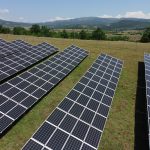Recalibrating an oversupplied market to spur investments and innovation
This NGO Briefing presents the views of CAN Europe, Greenpeace, Sandbag and WWF on the reform of EU ETS in the short and medium term.
The European Parliament will soon vote on the European Commission’s proposal to amend the EU’s Emissions Trading Scheme (EU ETS) Directive. In order to correct the massive imbalance between supply and demand in the carbon market, the European Commission has proposed to delay the auctioning of 900 million (mln) allowances, a process called “backloading”. The Parliament and EU governments have been asked to clarify the mandate of the Commission with regards to delaying the timing of emission allowance auctions.
With the carbon price hitting a new record low every day and the EU’s consumption of coal skyrocketing, the risk of the EU getting locked into a high-carbon infrastructure is more likely than ever. Industry and power producers have no incentive to switch from high-emitting fossil fuels to cleaner production because paying for their CO2 emissions has become much cheaper over the short-term than investing in energy efficient technologies. As a consequence, in many Member States, including Germany, Poland and the Netherlands, new coal fired power plants are either planned or under construction while much-needed investments in low-carbon innovation are being delayed.
The back-loading proposal is just a temporary solution; the ETS needs structural reform. At the same time, it’s the only solution that can save the EU’s carbon market from total collapse in the short term.
In the context of the Energy Efficiency Directive and the 2050 Low-carbon Roadmap, the European Parliament requested the European Commission to present measures to strengthen the EU ETS, including withholding a number of allowances.
Five reasons why back-loading MUST be quickly adopted and followed by structural measures
• The EU ETS is currently not functioning as envisaged. The Scheme is neither delivering cost-effective achievement of the EU’s agreed climate objective of 80-95% emission reductions by 2050, nor accelerating the transition to a low-carbon Europe.
• With back-loading and ETS structural reform in place, auctioning revenues for all Member States will increase significantly between 2013 and 2020. With the right policy choices, these funds can mobilise investments in innovative clean technologies in the power sector and industry. They can also be used to reduce other taxes and to compensate for any potential increase in electricity prices for consumers.
• A restored carbon price signal will accelerate the modernisation of the power sector in new EU Member States that applied for continued free allocation of allowances for their power producers after 2012. Central and Eastern European countries are obliged to invest the value of free allowances into the upgrade of their power systems, therefore a restored carbon price signal will increase the value of necessary investments, accelerating modernisation of their power sectors.
• Restoring the relevance of the ETS price signal is critical to prevent distortion of the EU internal energy market. Without immediate repair of the ETS, it is likely that EU governments will take the matter into their own hands and implement their own policies. In the absence of consistent, EU-wide rules, costs and risks for investors would increase, jeopardising much-needed investments in modernisation of the EU energy sector.
• Moreover, a well-functioning ETS accelerates energy efficiency improvements. This will help shield European industry from fossil fuel price fluctuations and increase its competitiveness.
Would you like to know more reasons why we need back-loading, followed by structural ETS reform? See the new CAN Europe, Greenpeace, WWF and Sandbag briefing
Download EU ETS at a crossroads – NGO Briefing – January 2013



